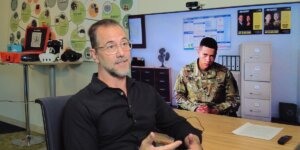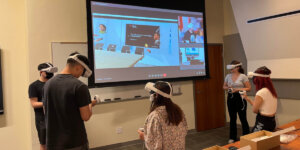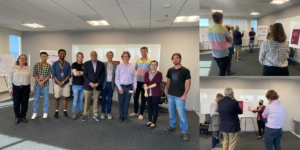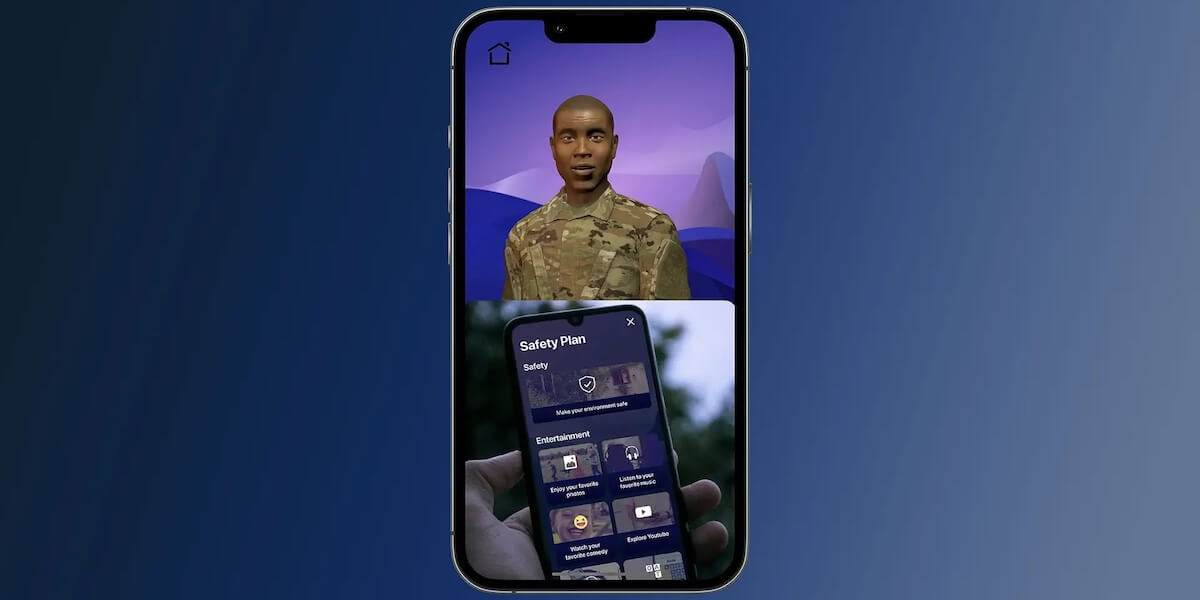
A recent prototype of the Battle Buddy Application. Photo Credit: USC Institute for Creative Technologies
In 2021, a San Antonio-area veteran texted the Veteran’s Crisis Line. The responder didn’t send help and terminated the text thread without verifying that a safety plan had been enacted.
Minutes later, the veteran died by suicide.
Every year, according to the U.S. Department of Veteran Affairs (VA), we lose over 6,000 veterans to suicide. That’s an average of 17 lives daily.
In response to this crisis, the VA has embarked on, a decade-long initiative known as “Mission Daybreak,” dedicated to breaking the cycle of veteran suicide.
The Virtual Human Therapeutics Lab (VHTL) inside the USC Institute for Creative Technologies (ICT) is actively advancing this mission through equitable and accountable AI practices and the incorporation of virtual humans into the healthcare domain. Their objective is to smoothly incorporate virtual humans into the healthcare system, thereby broadening accessibility and delivering vital assistance directly to veterans via their smartphones. It also helps address the issue of prolonged wait times that veterans often encounter, with some having to wait for months to receive the care they need.
At the forefront of this transformative effort stands VHTL’s mobile application “Battle Buddy for Suicide Prevention.” The application’s interactive, Virtual Human utilizes the VA’s suicide safety planning process and provides mental health skill-building during brief daily check-ins with veterans. One of the visionaries behind this concept is Sharon Mozgai, VHTL director, who helped secure a $1 million dollar award earlier this year, solidifying Battle Buddy’s place among the prestigious Mission Daybreak winners.
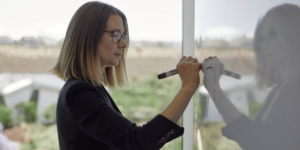
Sharon Mozgai, USC ICT Director, Virtual Human Therapeutics Lab
“The current Suicide and Crisis Lifeline number is 988,” said Mozgai, “which brought over 200 crisis centers together into one easy to remember 3-digit number, making it more likely to have someone answer and reduce wait times. We know that people who call suicide hotlines report a reduction in suicidal thinking and feelings of depression ”
“The problem is that people don’t call these numbers when they’re suggested to call.”
Having a strong background in psychology, organizational behavior, and computational linguistics, Mozgai initially joined USC ICT in 2015.
Years later, she has now become a name synonymous with the merger of human emotion and artificial intelligence. Mozgai has a simple, yet profound mission: to harness the power of virtual reality and artificial intelligence in creating therapeutic interactions that reduce barriers and increase access to care.
“The vision for Battle Buddy is an application with an ecosystem of resources that can predict who needs help and when. In the future machine learning algorithms may be able to identify moments of crisis and deliver targeted interventions at the user’s moments of greatest need, ” said Mozgai. “This project began with the idea of packing evidence-based interventions into an ecosystem led by a virtual human concierge.”
An early Battle Buddy prototype received the award for Best Technical Demonstration at the International Conference for Persuasive Technology 2023, a top interdisciplinary conference focused on work at the intersection of computer science and psychology.
Mozgai collaborated with Skip Rizzo, the USC ICT director for medical virtual reality, and Arno Hartholt, USC ICT’s director of research and development integration, along with the SoldierStrong Foundation to jointly develop Battle Buddy. By harnessing the power of virtual human interactions, veterans are offered solace and support against the emotional turmoil they may be facing. The mobile application also seamlessly incorporates wearable sensors, enabling the utilization of valuable data related to sleep, physical activity and diverse health metrics.
Mozgai and her team use the Virtual Human Therapeutics Lab as an innovation hub to assist in diligently developing virtual humans capable of gauging and responding to human emotion.
“We want to create an engaging experience, and to do that, there needs to be a focus on human-centered design. It’s very important to us for our end users to be involved from day one,” said Mozgai. “Working with psychologists, people who answer crisis lines, and of course, our veterans, and having them engage in the human-centered design process of Battle Buddy to create relevant virtual human features is key.”
The Virtual Human Therapeutics Lab under Mozgai’s guidance is a canvas where technology meets empathy. The deep understanding of PTSD, combined with cutting-edge technology, positions the Battle Buddy project as a beacon of hope for veterans.
“Virtual humans offer the potential to provide accessible and scalable interventions that can complement traditional care and address the increasing demands of this mental health crisis,” said Mozgai. “At the most basic level, virtual humans can reduce healthcare costs and alleviate the burden on staff through the automation of routine tasks.”
Beyond Battle Buddy, the VHTL is engaged in other transformative projects, including VITA OCS, which employs virtual human interviewees to help individuals practice interview skills and alleviate their anxieties surrounding the process. Additionally, they are delving into the Personalized Soldier Avatars project, which investigates the impact of using personalized avatars versus generic ones in a combat simulation to uncover the psychological nuances at play. It also allows soldiers to practice and consolidate important battlefield decision-making and individual skills in a safe and cost-effective manner.
Mozgai shares her vision for VHTL’s future, outlining plans to move forward with testing the prototype developments of Battle Buddy and VITA OCS, with eventual public releases on the horizon. The completion of the Personalized Soldier Avatars project is slated for 2024.
“Virtual humans can empower patients to take an active role in their healthcare by offering information, reminders, and guidance in a discreet and nonjudgmental manner, thereby reducing the stigma associated with certain health issues,” said Mozgai. “Most importantly, virtual humans have the potential to enhance patient outcomes and save lives through data-driven insights, the early detection of health issues, and the delivery of targeted and timely interventions.”
Published on November 8th, 2023
Last updated on November 8th, 2023





